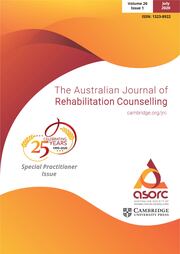Article contents
Rehabilitation Counsellor Preferences for Rural Work Settings: Results and Implications of an Australian Study
Published online by Cambridge University Press: 15 October 2015
Abstract
This study sought to identify influences on rehabilitation counsellors' preference to work in rural areas, including their recruitment to, and retention in, rural work settings. Participants were 38 practicing rehabilitation counsellors (31% males) recruited through the Australian Society of Rehabilitation Counsellors and the Rehabilitation Counselling Association of Australasia. The mean age of participants was 38.67 years (SD = 12.9 years, age range, 25 to 65 years). Nineteen (50%) were working in rural areas at the time of the survey. A specifically designed survey, the Work Setting Preference Inventory (WSPI), which incorporated both quantitative and qualitative response options, was used to collect data. Analysis involved open coding of data into themes that emerged from the participants' responses. Descriptive statistical analysis was applied to quantify the prevalence or salience of particular themes. Results suggest that participants perceived preference to work in rural area to be influenced by the unique lifestyle of rural communities and family friendly employer policies. They perceived the availability of employment and training opportunities and supplemental financial compensations as incentives to attract rehabilitation counsellors to work in rural areas. Programs to recruit rehabilitation counsellors to rural areas should address employee lifestyle preferences in the context their overall career development.
- Type
- Articles
- Information
- The Australian Journal of Rehabilitation Counselling , Volume 17 , Issue 1 , 01 June 2011 , pp. 1 - 14
- Copyright
- Copyright © Cambridge University Press 2010
- 2
- Cited by




